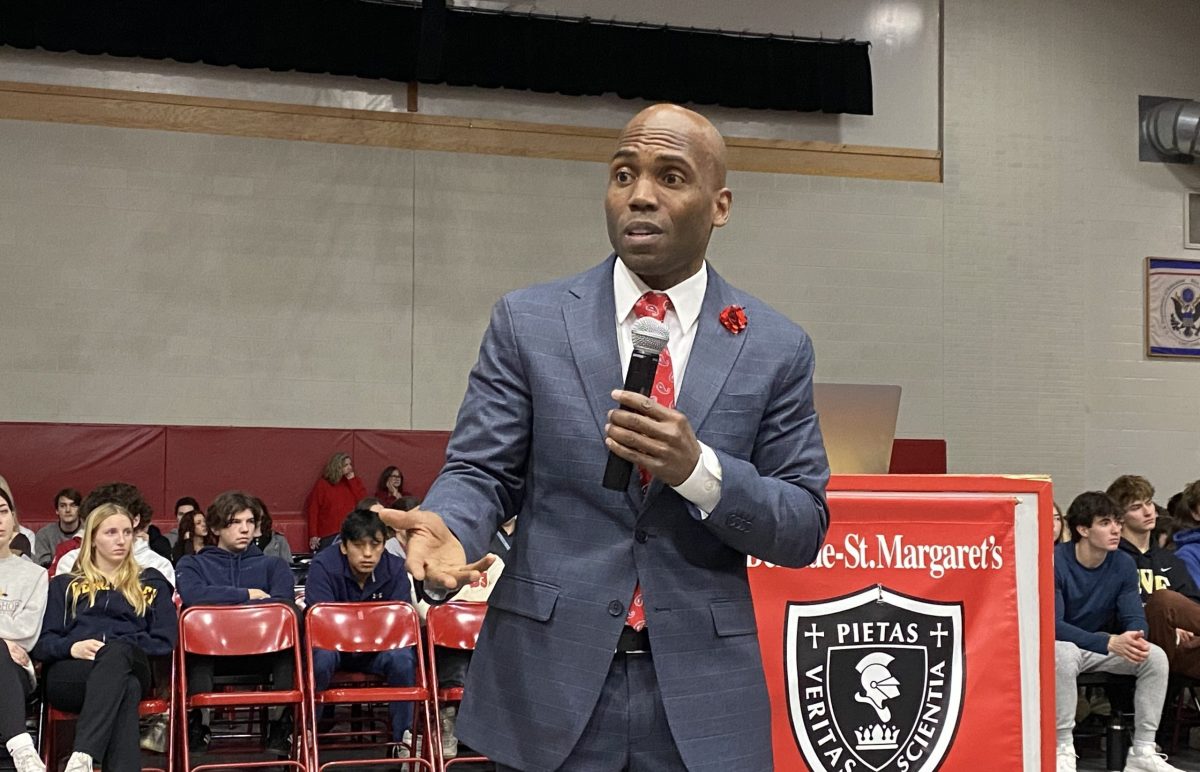Dr. Yohuru Williams, the Distinguished University Chair and Professor of History and Founding Director of the Racial Justice Initiative at the University of St. Thomas, visited Benilde-St. Margaret’s on February 8th to speak to BSM and St. Louis Park students. Williams dissected the modern civil rights movement, social justice, and the significance of education, as well as providing students with valuable insights into the importance of consciousness in a society filled with injustices.
To celebrate Black History Month this February, Benilde-St. Margaret’s has planned many events, but the main focus has been speaking engagements. With the encouragement of President Danielle Hermanny, BSM reached out to Dr. Yohuru Williams, who dedicated his entire day with the Red Knight community. “Dr. Williams’ [visit] was probably one of our biggest speaking engagements we’ve had here [at] BSM for a while, [and] as it relates to Black History Month it’s very influential,” BSM Director of Equity, Inclusion and Belonging Dennis Draughn said.
Williams warned students about the dangers of sleepwalking and closing your eyes just because you’re uncomfortable, and encouraged students to be conscious. This consciousness–which can be fostered by education and remembering to question the system–leads to the ability to stand up against the injustices and racism our eyes are then open to. For Williams, the death of Gary Crooks, a boy who died on city property, was the event that sparked this consciousness and activism. “I think in the same way that we are living through a moment of community trauma with George Floyd, [I grew up in] a moment of community trauma, [which] for me was the death of Gary Crooks… It was out of that moment of trauma that we have this community center [built to commemorate Crooks] and that’s where my activism emerged,” Williams said.
Before the talk, BSM students were able to hear from Williams during their theology classes, as his speech was aptly tied to the course material. Williams’ argument for social justice reflected the importance of the Catholic Social Teachings and connected BSM’s mission to the importance of taking action against injustices. “I’m going to talk about… this idea that at the core, when we think about mission-driven institutions like Benilde-St. Margaret’s, like St. Thomas, that mission is important. And so we can’t sleep walk through that mission. We can’t assume that it doesn’t speak to us in a meaningful way and call us to action,” Williams said.
Williams hoped students left his talk with new understandings:
“I hope they see the ways in which BSM’s mission isn’t just words, but that it should, by definition, draw us to think about what our responsibility is in a participatory democracy and beyond. So this is the idea that John Lewis put together, [that] we can redeem the soul of America, but we have to make a commitment to what that looks like. Every day, we have to wake up. We can’t sleepwalk through that revolution… And then last but not least, I hope students just come away with an appreciation for the fact that Black history is American history, that when we compartmentalize the history culture, we do ourselves a disservice. What we should be thinking about is our shared humanity,” Williams said.
According to Draughn, speakers like Williams provide students with a sense of what college lectures are like, offering opportunities for conversations that challenge students’ critical thinking skills. However, more than just the college-preparatory aspect, these speakers share diverse and complex messages that are important for students to hear. “I think it’s important for everyone to understand because [even] if the topic goes over people’s heads, it’s important… not only for them just to hear it, but [to] listen and internalize it. There’s a difference between just hearing what someone has to say that’s important and influential, and internalizing the message so that it resonates with you, and you can take a piece of it and move forward,” Draughn said.
We are honored to have him share his scholarly Journey and discuss the significance of education in advancing black excellence in society and combating generational poverty. He will discuss the modern civil rights movement, emphasizing the difference between mass organizing and mass mobilization in achieving progress and social justice. Also, Dr. Williams will discuss the importance of social justice and activism and suggest ways students can contribute to their local community. His personal experiences will provide valuable insights into the significance of scholarship and perseverance.




































![Teacher Lore: Mr. Hillman [Podcast]](https://bsmknighterrant.org/wp-content/uploads/2025/03/teacherlorelogo-1200x685.png)




